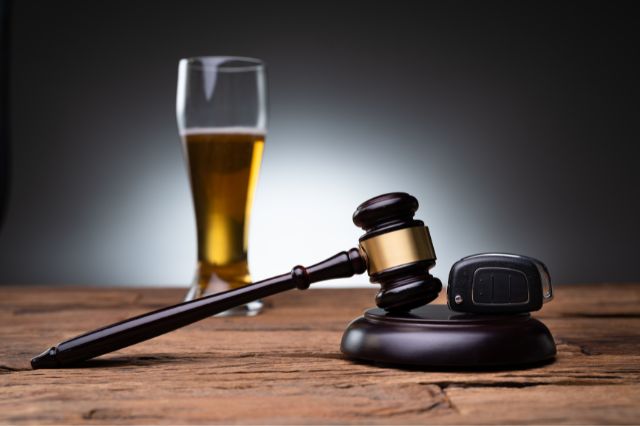Law
The Unseen Consequences of a DUI Conviction: Job, Reputation, and Beyond

A DUI conviction often conjures images of revoked licenses or hefty fines, but what about the less-discussed aftermath? The aftermath of a conviction can extend far beyond the courtroom and touch every area of your life.
6 Long-Term Consequences of DUI Convictions
The moment you’re pulled over, arrested, and charged with a DUI is a bad night. It can feel embarrassing and horrifying. However, the short-term consequences pale in comparison to what comes down the road.
“I don’t think your average person realizes how much of an impact a DUI conviction has on the rest of their life,” attorney Rowdy G. Williams warns. “It’s not just an expensive fine and embarrassing moment. It can actually prevent you from building that career you want.”
For a little perspective, here are some of the “unseen” consequences that come with a DUI conviction.
1. Job and Career Implications
You might think a DUI only affects your personal life, but that would be incorrect. A DUI conviction can seriously impact your career opportunities and job prospects. Many employers actively conduct background checks when evaluating candidates. A DUI conviction will raise concerns about your responsibility, reliability, and judgment as an employee. And if you’re in a position that requires you to drive on the job, forget about it. No company will willingly take on that risk or liability.
2. Reputation Damage
A DUI conviction doesn’t just affect your legal status; it can also damage your reputation within their community, social circles, and professional networks. News of a conviction can spread quickly through word of mouth or even media coverage, impacting how others perceive you. This can be particularly embarrassing and frustrating for both you and your loved ones.
3. Strained Relationships
Don’t underestimate how much strain a DUI conviction puts on personal relationships. It can create tension within your family and even lead to a divorce or breakup with your significant other or romantic partner. That’s not something you want to risk.
4. Guilt and Stigma
People who are convicted of a DUI often experience feelings of guilt. You might blame yourself for making a stupid decision. And if anyone was hurt, that adds another layer of guilt.
Ultimately, all of the guilt you experience compounds with the public stigma that’s associated with driving under the influence. This leads to a downward spiral of shame and isolation. Many people say that a DUI conviction has seriously impacted their mental health and self-esteem – something that doesn’t go away quickly.
5. Increased Insurance Costs
In terms of dollars and cents, the DUI penalties and fines aren’t the only expenses you’ll see. Insurance companies see drivers who have been convicted of past DUIs as major liabilities. As such, they increase insurance premiums significantly.
According to Forbes Advisor’s analysis, “The national average auto insurance rate increase for drivers with a DUI is 70%. That king-size rate increase translates to an extra $1,470 a year for car insurance. By comparison, the average rate increase after a speeding ticket is only 22% and the rate increase after an accident is 42%.”
So if you’re looking to keep your monthly expenses low, a DUI is the last thing you need!
6. Permanent Record
Perhaps one of the most profound and enduring consequences of a DUI conviction is the creation of a permanent criminal record. This record becomes a part of an individual’s legal history and is accessible to potential employers, landlords, lenders, and others who may conduct background checks. As a result, securing housing, obtaining loans, and even pursuing certain career paths can become significantly more challenging.
Many educational institutions and licensing boards conduct background checks as part of their application processes. Depending on the severity of the conviction and the requirements of the institution or board, a DUI conviction could potentially hinder your ability to enroll in certain programs or obtain professional licenses.
Don’t Let a DUI Conviction Wreck Your World
Law enforcement officers and state courts take DUIs very seriously – and rightly so! But if you’ve been wrongly convicted, or feel like the charges you’re facing aren’t accurate, it’s important that you do something to fight back. You can’t afford to let a DUI conviction change your life for the worse! Contact an attorney and develop a plan to fight back so that you can avoid the long-term consequences outlined above.
Law
5 Essential Tips for Child Custody During Divorce


Divorce is complex, and child custody can be the most emotionally charged aspect of the whole ordeal. Unfortunately, many parents unintentionally go into divorce unprepared for how to approach child custody. As a result, they end up making costly mistakes that prevent them from getting the outcome they desire.
1. Prioritize Your Child’s Needs
First things first, always put your child’s needs first. This sounds obvious, right? But in the heat of a divorce, it’s easy to get caught up in your feelings towards your ex-partner. Courts are primarily interested in what’s best for your child, not which parent “wins.”
“Cases involving contested child custody are common in situations that involve contentious divorces or separations,” HGC Law explains. “If the parents fail to agree on a fair custody and visitation schedule, the judge will intervene and make the decision for them. In such cases, judges will always consider the child’s best interests above everything else.”
So, when you’re discussing custody, think about what will genuinely benefit your child. Does your child need to stay in the same school? Keep close to their friends and family? These are the kinds of questions the judge will consider important.
2. Show Stability in Your Life
Courts take the stability of your life into account when making custody decisions. They want to make sure that you can provide a secure environment for your child. This means having a steady job, a safe home, and a routine that supports your child’s daily needs.
If you’re moving homes or changing jobs, try to keep other parts of your life as stable as possible. Show the court that your child’s life won’t be a rollercoaster of changes. Doing this may require you to make some pretty substantial changes or sacrifices, but that’s what it takes to get custody in a contentious divorce.
3. Keep Detailed Records
You know you’re a great parent, but the court needs more than just your word. Start keeping a detailed record of your involvement in your child’s life. This could include things like attending school events, doctor’s appointments, or any regular activities you do with your child. You want it to be clear that you are a regular, consistent, and necessary part of your child’s life on a daily basis – not just when it’s convenient for you.
It’s also a good idea to keep a record of conversations and decisions you make with your ex-partner regarding your child.
This documentation can be very persuasive in court, showing that you are actively engaged in your child’s well-being. (The last thing you want is for the court to feel like you’re only engaged right now because there’s an important decision on the line. You want them to see that you have and always will be involved.)
4. Communicate Effectively
How you handle communication with your ex can greatly affect your custody case. Always aim to be clear, respectful, and cooperative. Courts favor parents who demonstrate the ability to work together for their child’s benefit.
If you communicate through texts or emails, remember that these can be shown in court. So, think carefully about how you word things. It’s easy for a short, snappy text to be taken out of context when shown as a screenshot in a courtroom. Avoid sarcasm and jokes that cross the line. Always keep it polite and focused on your child.
5. Get the Right Legal Advice
Don’t underestimate the importance of good legal representation. A lawyer who specializes in family law can guide you through the complexities of custody laws and help you prepare your case in a strategic manner that supports the outcomes you’re looking for. They can also offer strategies based on your specific circumstances and help you avoid common pitfalls.
If possible, look for a lawyer who has experience with cases similar to yours and can give you an honest assessment of what to expect. You want someone who has practiced family law in your area for many years, as they’ll have the experience and knowledge needed to help you get a more favorable outcome.
Put Your Children First
When you love your child so much, it can be really difficult to see clearly and make unbiased decisions. In a sense, you’ll do anything possible to make sure you get custody of your child. But that’s not the right approach to take.
Yes, you need to fight for your child so that you can have as much positive influence over them as possible. However, you also have to understand that there’s power in a child having a healthy relationship with both parents – even if you’re separated or divorced.
Make sure you do everything you can to put your child first, even if that means splitting custody or establishing some other arrangement that allows you both to be in the child’s life.
Law
How Long Does a DUI Stay on Your Record in Utah?


Dealing with the aftermath of a DUI (Driving Under the Influence) conviction in Utah can be a long-term concern, particularly regarding how long the conviction stays on your record.
This is a critical question for many who have faced this challenge, as it impacts various aspects of life, from job prospects to insurance rates. In Utah, DUI convictions are not taken lightly.
In fact, according to the Utah Department of Public Safety, there were 9,205 DUI arrests in Utah in 2020 alone, demonstrating the state’s commitment to road safety. Let’s delve into understanding the longevity of a DUI on your record in Utah and what it means for you.
Duration of a DUI on Your Record in Utah
In Utah, a DUI conviction is a serious offense that remains on your criminal record for a significant amount of time. Here’s what you need to know:
- Ten-Year Period: In Utah, a DUI conviction remains on your driving record for ten years. This period is crucial because a second DUI within this timeframe can result in more severe penalties, as it is considered a repeat offense.
- Criminal Record: On your criminal record, a DUI conviction can remain even longer. Utah does not have a specific expungement period for DUI convictions, meaning it could potentially stay on your criminal record indefinitely.
Impact of a DUI on Your Life
Having a DUI on your record can affect several areas of your life:
- Employment Opportunities: Employers often conduct background checks, and a DUI conviction could affect your job prospects.
- Insurance Rates: Auto insurance rates may increase significantly after a DUI conviction.
- Personal Relationships: The stigma of a DUI conviction can strain personal and professional relationships.
Steps to Mitigate the Impact
- Legal Assistance: Consulting with a lawyer can provide guidance on dealing with the DUI conviction and exploring options like expungement, if applicable.
- Behavioral Programs: Participating in DUI education or rehabilitation programs may be beneficial.
- Responsible Driving: Committing to responsible driving post-conviction can help rebuild your record.
Understanding Expungement in Utah
Expungement is the legal process of removing a conviction from your public record. In Utah, the eligibility for expunging a DUI conviction depends on several factors, including the nature of the offense and your overall criminal record.
It’s important to consult with legal experts to understand if expungement is an option for your situation.
FAQs about DUI Convictions in Utah
Can I ever get a DUI removed from my driving record in Utah?
- While a DUI stays on your driving record for ten years, you may explore expungement options for your criminal record based on specific criteria.
Does a DUI affect my driver’s license in Utah?
- Yes, a DUI conviction can lead to license suspension or revocation, depending on the severity of the offense.
What should I do immediately after a DUI arrest in Utah?
- It’s important to seek legal counsel to understand your rights and the best course of action, including potential defenses and plea options.
Conclusion
A DUI conviction in Utah can have long-lasting effects on both your driving and criminal records. Understanding the duration and impact of this conviction is crucial for those seeking to navigate their post-DUI life.
While the journey may be challenging, being informed, taking proactive steps towards rehabilitation, and seeking professional legal advice can help mitigate the long-term consequences of a DUI on your record.
Remember, responsible driving is not only about adhering to the law but also about ensuring the safety and well-being of yourself and others on the road.
Law
How Do I File a Police Report in Tampa for a Car Accident Injury?


Being involved in a car accident can be a harrowing experience, especially if it results in personal injury. In Tampa, as in the rest of Florida, it is essential to file a police report immediately following an accident.
This is not just a legal requirement; it’s a crucial step in protecting your rights, especially if you need to seek the counsel of a Tampa personal injury lawyer later.
In Florida, there were over 400,000 car accidents in 2019 alone, highlighting the importance of understanding the process of filing a police report in such situations.
Step-by-Step Guide to Filing a Police Report in Tampa
- Ensure Safety and Assess Injuries: Before anything else, ensure everyone’s safety. If there are injuries, call 911 immediately.
- Notify the Police: Florida law requires that a police report be filed for any car accident that results in injuries or significant property damage. You can call the local police or 911 to report the accident.
- Wait for the Police to Arrive: Do not leave the scene of the accident before the police arrive. Leaving the scene, especially when there are injuries, can result in severe penalties.
- Provide Accurate Information: When the police arrive, provide them with as much accurate information as possible about the accident. This includes your personal information, details of the accident, and any observations about injuries and damages.
- Get a Copy of the Police Report: The officer at the scene will fill out a police report. Ask for a copy or the report number. The report will be vital if you need to file an insurance claim or consult with a Tampa personal injury lawyer.
- Take Photos and Gather Information: If possible, take photos of the accident scene, including vehicles, road conditions, and any visible injuries. Also, exchange information with the other driver(s) involved.
- Seek Medical Attention: Even if you don’t think you’re seriously injured, it’s important to seek medical attention immediately. Some injuries are not immediately apparent.
Why Filing a Police Report is Crucial
- Legal Requirement: It’s legally required in Florida to report an accident involving injuries.
- Documentation for Claims: The report provides an official account of the accident, crucial for insurance claims or legal proceedings.
- Determining Fault: A police report is a key piece of evidence in determining fault in an accident.
Consulting with a Tampa Personal Injury Lawyer
After an accident with injuries, consulting with a Tampa personal injury lawyer can be beneficial:
- Legal Advice: A lawyer can offer advice on how to proceed with insurance claims or potential legal action.
- Representing Your Interests: A lawyer can represent you in dealings with insurance companies or in court, ensuring your interests are protected.
- Maximizing Compensation: An experienced attorney can help ensure you receive fair compensation for your injuries and other losses.
Fortunately, some of the best personal injury lawyers are in Tampa, such as Kemp Law.
FAQs about Filing a Police Report in Tampa
How long do I have to file a police report after a car accident in Tampa?
- You should report the accident to the police immediately, and no later than 10 days after the accident.
Can I file a police report if I’m not at fault?
- Yes, you should always file a police report, regardless of who is at fault.
What if the police don’t come to the accident scene?
- If the police don’t arrive, you can visit the nearest police station to file a report, or in some cases, file a report online.
Conclusion
Filing a police report after a car accident in Tampa is a critical step, especially in cases involving injuries. It serves as an official record of the incident and is crucial in any subsequent legal or insurance claims process.
Understanding this process and consulting with a Tampa personal injury lawyer when necessary can significantly impact the resolution of any issues arising from a car accident. Remember, your safety and legal rights should always be a priority in these situations.
-



 Captions3 years ago
Captions3 years ago341 Sexy Captions to Fire Up Your Instagram Pictures
-



 Captions3 years ago
Captions3 years ago311 Night Out Captions for Instagram and Your Crazy Night
-



 Captions3 years ago
Captions3 years ago245 Saree Captions for Instagram to Boost Your Selfies in Saree
-



 Captions3 years ago
Captions3 years ago256 Best Ethnic Wear Captions for Instagram on Traditional Dress
-



 Captions3 years ago
Captions3 years ago230 Blurred Picture Captions for Instagram
-



 Captions3 years ago
Captions3 years ago275 Deep Captions for Instagram to Express Your Thoughts
-



 Quotes3 years ago
Quotes3 years ago222 Nail Captions for Instagram to Showcase Your Fresh Manicure
-



 Captions3 years ago
Captions3 years ago211 Laughing Captions for Instagram | Laughter Is the Best Medicine







